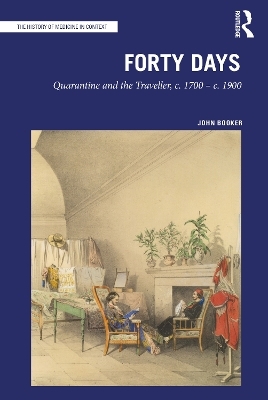
Forty Days
Quarantine and the Traveller, c. 1700 – c. 1900
Seiten
2023
Routledge (Verlag)
978-1-032-05035-5 (ISBN)
Routledge (Verlag)
978-1-032-05035-5 (ISBN)
This book provides a timely reminder that no traveller in past centuries could return from the East without spending up to forty days in a ‘lazaretto’ to ensure that no symptoms of plague were developing. It will appeal to all those interested in the history of medicine and the history of travel.
Forty Days: Quarantine and the Traveller, c. 1700 –1900 provides a timely reminder that no traveller in past centuries could return from the East without spending up to 40 days in a lazaretto to ensure that no symptoms of plague were developing. Quarantine was performed in virtual prisons ranging from mud huts in the Danube basin to a converted fort on Malta, evoking every emotion from hatred and hostility through to resignation and even contentment. Drawing on the diaries and journals of some 300 men and women of many nationalities over more than two centuries, the author describes the inadequate accommodation, poor food and crushing boredom experienced by detainees. The book also draws attention to comradeship, sickness, and death in detention, as well as Casanova’s unique ability to do what he did best even in the lazaretto of Ancona. Other well-known detainees included Hans Christian Andersen, Mark Twain and Sir Walter Scott. Lavishly illustrated, the work includes a gazetteer of 49 lazarettos in Europe and Asia Minor, with inmates’ comments on each. This book will appeal to all those interested in the history of medicine and the history of travel.
Forty Days: Quarantine and the Traveller, c. 1700 –1900 provides a timely reminder that no traveller in past centuries could return from the East without spending up to 40 days in a lazaretto to ensure that no symptoms of plague were developing. Quarantine was performed in virtual prisons ranging from mud huts in the Danube basin to a converted fort on Malta, evoking every emotion from hatred and hostility through to resignation and even contentment. Drawing on the diaries and journals of some 300 men and women of many nationalities over more than two centuries, the author describes the inadequate accommodation, poor food and crushing boredom experienced by detainees. The book also draws attention to comradeship, sickness, and death in detention, as well as Casanova’s unique ability to do what he did best even in the lazaretto of Ancona. Other well-known detainees included Hans Christian Andersen, Mark Twain and Sir Walter Scott. Lavishly illustrated, the work includes a gazetteer of 49 lazarettos in Europe and Asia Minor, with inmates’ comments on each. This book will appeal to all those interested in the history of medicine and the history of travel.
Dr. John Booker, F.R.Hist.S., is an independent scholar based in Devon.
Introduction 1. Reasons, Regimes and Routes 2. Quarantine: the Social Leveller 3. First Impressions 4. Passing the Time 5. Reckoning and Departure Gazetteer: Quarantine Stations and Lazarettos
| Erscheinungsdatum | 06.09.2021 |
|---|---|
| Reihe/Serie | The History of Medicine in Context |
| Zusatzinfo | 1 Halftones, color; 51 Halftones, black and white; 1 Illustrations, color; 51 Illustrations, black and white |
| Verlagsort | London |
| Sprache | englisch |
| Maße | 156 x 234 mm |
| Gewicht | 380 g |
| Themenwelt | Geschichte ► Allgemeine Geschichte ► Neuzeit (bis 1918) |
| Studium ► Querschnittsbereiche ► Epidemiologie / Med. Biometrie | |
| Studium ► Querschnittsbereiche ► Geschichte / Ethik der Medizin | |
| ISBN-10 | 1-032-05035-7 / 1032050357 |
| ISBN-13 | 978-1-032-05035-5 / 9781032050355 |
| Zustand | Neuware |
| Informationen gemäß Produktsicherheitsverordnung (GPSR) | |
| Haben Sie eine Frage zum Produkt? |
Mehr entdecken
aus dem Bereich
aus dem Bereich
Giordano Bruno - ein ketzerisches Leben
Buch | Hardcover (2024)
C.H.Beck (Verlag)
CHF 41,85
das dramatische 16. Jahrhundert
Buch | Hardcover (2024)
Rowohlt Berlin (Verlag)
CHF 47,60


